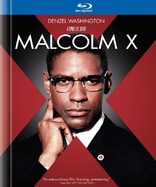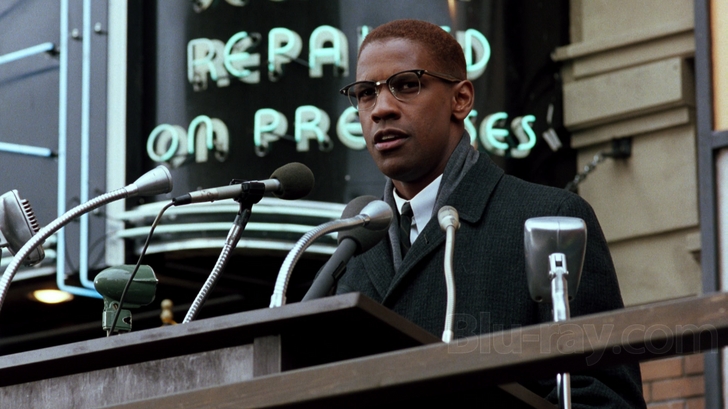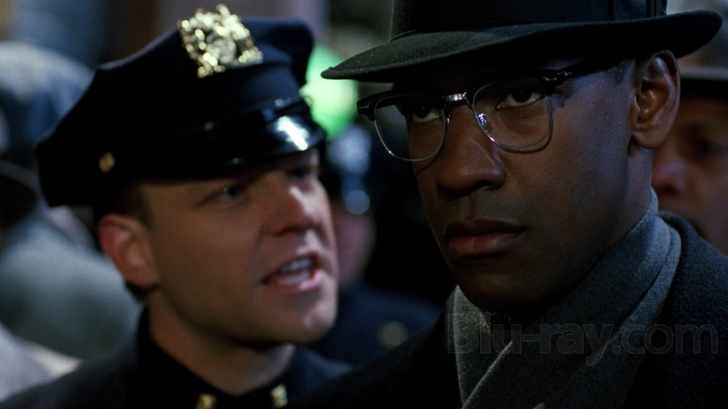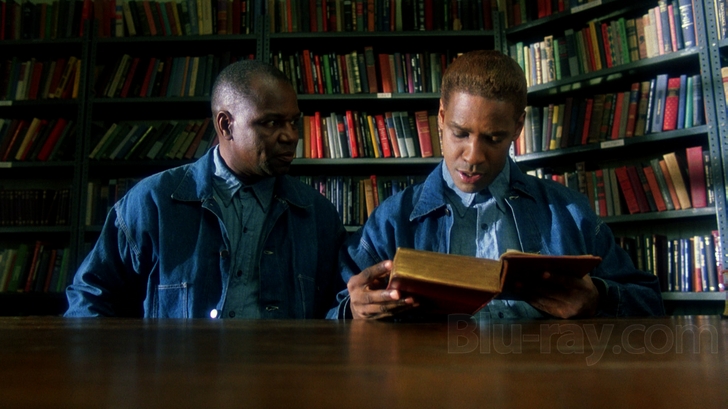Malcolm X Blu-ray Movie
HomeMalcolm X Blu-ray Movie 
Includes 1972 Documentary "Malcolm X"Warner Bros. | 1992 | 202 min | Rated PG-13 | Jan 31, 2012

Movie rating
8 | / 10 |
Blu-ray rating
| Users | 4.6 | |
| Reviewer | 4.0 | |
| Overall | 4.1 |
Overview
Malcolm X (1992)
The story of Malcolm X, who emerged from the streets to become a powerful voice for the black rights movement in America.
Starring: Denzel Washington, Angela Bassett, Albert Hall, Al Freeman Jr., Delroy LindoDirector: Spike Lee
| Drama | Uncertain |
| Period | Uncertain |
| History | Uncertain |
| Biography | Uncertain |
| Epic | Uncertain |
Specifications
Video
Video codec: MPEG-4 AVC
Video resolution: 1080p
Aspect ratio: 1.78:1
Original aspect ratio: 1.85:1
Audio
English: DTS-HD Master Audio 5.1 (48kHz, 16-bit)
French: Dolby Digital 2.0
Spanish: Dolby Digital 2.0
Italian: Dolby Digital 2.0
French and Spanish tracks are 2.0 surround encoded, not 2.0 stereo
Subtitles
English SDH, French, Italian SDH, Portuguese, Spanish, Danish, Finnish, Norwegian, Swedish
Discs
50GB Blu-ray Disc
Two-disc set (1 BD, 1 DVD)
Playback
Region free
Review
Rating summary
| Movie | 4.5 | |
| Video | 4.0 | |
| Audio | 4.0 | |
| Extras | 4.0 | |
| Overall | 4.0 |
Malcolm X Blu-ray Movie Review
"We didn't land on Plymouth Rock. Plymouth Rock landed on us!"
Reviewed by Kenneth Brown February 2, 2012Brothers and sisters. I'm here to tell you that I charge the white man. I charge the white man with being the greatest murderer on earth. I charge the white man with being the greatest kidnapper on earth. There is no place in this world that that man can go and say he created peace and harmony. Everywhere he's gone, he's created havoc. Everywhere he's gone, he's created destruction... He can't deny the charges. You can't deny the charges. We're the living proof of those charges. You and I are proof. You're not an American. You are the victim of America. You didn't have a choice coming here. He didn't say: "Black man, black woman, cover on over and help me build America." He said, "Nigger, get down in the bottom of that boat. I'm taking you over there to help me build America." Being born here does not make you an American. I am not an American, you are not an American. You're one of the 22 million black people who are the victims of America. You and I, we've never seen any democracy. We ain't seen no democracy in the cotton fields of Georgia. There wasn't no democracy down there. We didn't see any democracy on the streets of Harlem, Brooklyn, Detroit, Chicago. Ain't no democracy down there. No, we've never seen democracy. All we've seen is hypocrisy. We don't see any American dream. We've experienced only the American nightmare.
Strong words. Angry words. Incendiary words. These are the controversial words that open Spike Lee's Malcolm X, as Civil Rights firebrand Malcolm Little (Denzel Washington), having converted to Islam and taken on the name Malcolm X, stands before a thunderous crowd and lays out his charges against White America. As the speech opens, an American flag fills the screen; a bold reference to Franklin Schaffner's Patton, which opens with the outspoken WWII general, played by George C. Scott, standing before an enormous American flag and rallying his troops on the eve of the Allied invasion of France. In Lee's version of this iconic scene, though, Malcolm X is nowhere to be seen and footage of the infamous 1991 Rodney King beating -- an event Malcolm X, assassinated in 1965, didn't live to see -- flashes on screen. All the while, the flag, full of promise and color, begins to burn. Flames creep across its stars and stripes as Malcolm X turns his attention to democracy, leaving only a charred "X" of a flag as cheers bring the speech to a close. It's a daring opening, a controversial opening, but it sets the tone for everything that follows. It also demands an answer to several crucial questions: How far is too far when railing against injustice? How militant is too militant when battling social oppression? Is unrest the ultimate means to achieving peace? Is inciting violent action, directly or indirectly, the same as taking violent action? Is isolation the only means to obtaining equality? These aren't just the questions the film demands us to answer. These are the questions anyone must answer when examining the life and times of Malcolm X.

"That's too much power for one man to have..."
After the smoke clears, the film retreats to Boston circa the early '40s. Malcolm Little, dubbed Detroit Red, and his friend Shorty (Spike Lee) are small-time criminals trying to carve out a piece of the American pie for themselves. Very little goes as the young schemers plan, of course, and robbery lands the two enterprising partners ten-year prison sentences. While serving his time, Malcolm is introduced to solitary confinement, reflects on his past and present and, eventually, converts to Islam, having played a hard-fought game of social and philosophical tug-of-war with Baines (Albert Hall), a fellow inmate, devout Islamic convert, and influential member of the African American religious movement, the Nation of Islam. Under Baines, Malcolm starts down a path that will guide him out of prison and into the public spotlight. "He taught you that black was a curse, and you believed that. The truth is lying there, if you read behind the words. You got to take everything the white man says and use it against him." Malcolm Little becomes Brother Malcolm and, soon thereafter, free from his physical and mental shackles, takes on the name Malcolm X. It isn't long before X draws countless black men and women to Nation of Islam's fold, criticizes other Civil Rights leaders and movements, meets and marries a woman named Betty (Angela Bassett), and develops a following of his own; something the Nation of Islam leaders later see as a threat, a coup-in-the-making even. Forced out of the Nation after rising to prominence, Malcolm X makes a pilgrimage to Mecca where he has a second, more measured conversion and returns to America a different man.
As startling and controversial a figure as Malcolm X was, as startling and controversial as Lee's film was upon its release, as starling and controversial as some will still feel it is, there's a careful balance to Lee's Oscar-nominated biopic. He presents Malcolm X as a complicated figurehead, righteous in anger, driven by loyalty but prone to impulse and overreaction. It's an interesting mixture too. Lee's Malcolm X embraces whatever he believes with intense zeal, even if it represents a complete and fundamental shift in everything he believed before. He resists steadfastly but sways the moment the proverbial light bulb switches on; he despises racism so deeply he indulges in it himself; he hates hypocrisy so intently that he becomes a hypocrite himself; he doesn't search for counterpoints to his arguments but adjusts the moment convincing counterpoints are forced upon him; he rallies his followers so fervently he has little choice but to survey the damage and make strides to clarify and retool his new positions. In doing so, Lee not only plums the depths of Malcolm X the man, but Malcolm X the revolutionary, Malcolm X the political movement, Malcolm X the philosophy, Malcolm X the symbol of militant activism. It's a full and captivating portrait of a man struggling with himself and his place in the world, with his identified people and their place in the world. Lee's portrait is only controversial because Malcolm X was and will remain controversial. Lee does his due diligence, though, stirring up the same outrage and shock X did, all while taking a cold, hard look at the nature and tenets of racism and its persistence in the decades since Malcolm X's death. Like X, Lee's film undergoes dramatic transformations -- the sudden halt to Malcolm's vitriol that comes after his pilgrimage to Mecca is almost jarring -- and, like X, Lee's film doesn't shy away from difficult subject matter or the darker days and decisions of Malcolm's life.
Washington does his due diligence as well, and then some. Arguably his greatest, most fully realized performance, Washington summons the charisma, anger, stubbornness, power, sadness, fervor, remorse and passion of Malcolm X, nearly disappearing as an actor in the process. His deft delivery and stoic ferocity makes it that much easier to see how throngs of people would flock to X and commit themselves to his cause; how his approach could unsettle everyone from fellow Civil Rights speakers to Nation of Islam leaders to the public at large; why his assassination was almost a certainty, so much so that it brings an amused grin to X and Washington's face just before the trigger is pulled. It only helps that he bears a resemblance to the man, that his smile beams as brilliantly, that his voice command as much authority as it does. Unless you're an ardent student of history, it's hard to picture anyone but Denzel Washington when discussing Malcolm X. (Even if you are, it might prove just as difficult.) The only misstep in the entire film (perhaps ironically) is Shorty. Behind the camera, Lee is a master craftsman. In front of the camera, he's something else entirely: an average actor. Despite all his casting triumphs, his decision to fill the role of Shorty stands as one of his biggest casting failures. He isn't bad, and his time on screen is short, but I'm not biting. Regardless of whether he was driven by enthusiasm, respect, or hubris, he should have stayed in the director's chair. Otherwise, Malcolm X is an amazing film made all the more memorable by Washington's turn as the polarizing activist and minister. It may be twenty years old, but it doesn't feel like it. It's as relevant today as it was in 1992, and Malcolm X's life remains as fascinating as it's ever been.
Here, at this final hour, in this quiet place, Harlem has come to bid farewell to one of its brightest hopes, extinguished now and gone from us forever. There are those who still consider it their duty, as friends of the Negro people, to tell us to revile him, to flee, even from the presence of his memory. To save ourselves by writing him out of the history of our turbulent times. And we will smile. They will say that he is of hate. A fanatic, a racist who can only bring evil to the cause for which you struggle. And we will answer and say unto them: Did you ever talk to Brother Malcolm? Did you ever touch him or have him smile at you? Did you ever really listen to him? Was he ever himself associated with violence or any public disturbance? For if you did, you would know him. And if you knew him, you would know why we must honor him. Malcolm was our manhood, our living, black manhood! This was his meaning to his people. And in honoring him, we honor the best in ourselves. However much we may have differed with him, or with each other about him and his value as a man, let his going from us serve only to bring us together now. Consigning these mortal remains to earth, the common mother of all, secure in the knowledge that what we place in the ground is no more now a man, but a seed which, after the winter of our discontent, will come forth again to meet us. And we will know him then for what he was, and is: a prince. Our own black shining prince who didnít hesitate to die because he loved us so.
Malcolm X Blu-ray Movie, Video Quality 

The Blu-ray edition of Malcolm X features an excellent 1080p/AVC-encoded transfer, true to director Spike Lee and cinematographer Ernest Dickerson's intentions. There are a few issues -- slight edge halos are visible from time to time, minor crush creeps in, and film grain, though intact and unobtrusive, spikes a bit on occasion -- but none of it is ever severe or troubling enough to disappoint or distract from the experience. When the film begins, though, casual viewers may pause. During Malcolm's young adult years, Lee and Dickerson rely on diffusion and other tricks of the trade to give the film a soft, hazy amber glow; one that doesn't exhibit a high level of fine detail but gives Malcolm's zoot suit days and small-time criminal nights a roughhewn, vintage look that makes his later years more stark and striking. As Malcolm flirts with danger and earns himself a prison sentence, the film, like X, slowly but steadily undergoes a change. Sharper than when it began, it emerges from solitary confinement with greater clarity; still soft at times, but demanding that much more attention. Closeups are revealing (even if they're not what I'd call razor-sharp), fine textures are relatively refined and well-resolved (insofar as the original photography allows), and edge definition is quite good (barring the shots that are sullied by the slight halos I mentioned before). Colors, meanwhile, are nice and natural throughout, primaries pack punch, skintones are lifelike on the whole, contrast is consistent, and black levels are rich and satisfying.
The encode itself is just as proficient. Significant artifacting, banding and other anomalies aren't a factor (significant being the key word), the print is in almost pristine condition (by luck, proper preservation, careful restoration or perhaps a combination of all three), and only a handful of blink-and-you'll-miss-em eyesores pepper the proceedings. Spec hounds may also be concerned that the 202-minute film is being "crammed" onto a single BD-50 disc (with extras and lossless audio in tow), but I didn't see any evidence of cramming, inefficient compression or, really, anything that would lead me to believe the film would have been better served if it were spread across two discs. Obviously, more disc space and a beefier bitrate would offer some measurable improvement, but when the film is in motion, I doubt that difference would be easily perceived, if at all. In the end, Warner has done well by Malcolm X. The award-winning biopic leaves its mark on Blu-ray, and fans and newcomers alike will take notice.
Malcolm X Blu-ray Movie, Audio Quality 

Warner's DTS-HD Master Audio 5.1 surround track is also faithful to the film's original sound design, even though that means the soundfield isn't as immersive or convincing as the sort that would grace Malcolm X if it were being made today. That said, very little comes up short. Dialogue is clean, clear and intelligible, with only a handful of lines being dragged beneath the more chaotic scenes and, as is more often the case, Terence Blanchard's LFE-bolstered score. Prioritization is still more than acceptable, thankfully, and ambience and other effects are given plenty of opportunities to shine. (Gunfire and breaking glass struck me as a bit tinny, but catalog connoisseurs won't be surprised.) Low-end output is hearty and strong, dynamics are more than serviceable, and rear speaker activity, while a tad inconsistent from scene to scene, adds welcome depth to what could have been a front-heavy, one-dimensional experience. It's Washington's voice, though, that commands the most respect, and rightfully so. Malcolm X's speeches, declarations and tirades lord over the soundscape, becoming larger than life in the process. It may not be a perfectly immersive mix, but it's definitely an engrossing one.
Malcolm X Blu-ray Movie, Special Features and Extras 

- Malcolm X, 1972 Documentary (SD, 92 minutes): Serving as a companion piece of sorts to Alex Haley and Malcolm X's "The Autobiography of Malcolm X" (published in 1965 in the months following Malcolm X's death), director Arnold Perl's 1972 documentary is a terrific addition to this release. Yes, it's presented in standard definition on its own DVD disc, and yes, an HD version would have been ideal. But that shouldn't prevent anyone from sinking in and soaking up all of the information it has on tap, all of which was culled from firsthand accounts and archive interviews, speeches and film footage. Some of the events and exchanges featured here also made their way into Lee's Malcolm X (in one way or another, at least). Still others did not, meaning Perl's film delves into aspects of X's life Lee simply didn't have time to explore (even in a three-and-a-half hour biopic). With Lee's film focusing so intently on Malcolm X himself, it also offers a look at the notable men and women who were inspired by X, counted him as a mentor or minister, and stood alongside him prior to his assassination. Malcolm X is presented in English Dolby Digital 2.0 with optional English SDH and Spanish subtitles.
- Audio Commentary: Though recorded separately, director Spike Lee, cinematographer Ernest Dickerson, editor Barry Alexander Brown and other select members of the crew provide a thoughtful and informative overview and analysis of the film, its development and production, its tone and unflinching approach, and more. They also touch on Malcolm X's life, family, speeches, and evolution as a cultural leader, the differences between X's reality and Lee's film, and the historical events and people who defined Malcolm X but didn't make it into Lee's telling of the story.
- By Any Means Necessary: The Making of Malcolm X (SD, 30 minutes): As if the disc's audio commentary weren't extensive enough, this terrific production documentary seals the deal. From the film's inception to filming to controversial release, it details the making of the movie, its casting and performances, its power and cultural impact, its legacy and more. There is some unavoidable overlap with the information garnered from the commentary but it hardly matters. The 20th Anniversary release may not offer dozens of extras, but what it does offer is well worth your time. Me? I'll take quality over quantity any day of the week.
- Deleted Scenes with Director Introductions (SD, 22 minutes): Nine deleted scenes are included -- "Malcolm and Shorty Watch Cagnie and Bogie," "Sophia and Peg Case a House," "The First Colored President of the United States," "The Evils of Pork," "The Pleasures of an Ice Cream Soda," "Malcolm Teaches Benjamin Discipline," "The Sphinx Nose, the Sphinx Lips," "Malcolm Must Return to America" and "A Second Chance to Answer the Question" -- each with an introduction from Lee.
- Theatrical Trailer (SD, 3 minutes)
Malcolm X Blu-ray Movie, Overall Score and Recommendation 

Malcolm X was a larger-than-life figure and Spike Lee's Malcolm X is a larger-than-life film. And, like the man himself, it isn't at all what you expect it to be. Even when you think you have it pegged, it shifts, adapts and evolves, becoming something richer, more rewarding and more fascinating. Washington's performance is magnificent as well, and it's almost impossible to look away every time he steps on screen. Warner's Blu-ray release is impossible to look away from too. With a terrific video transfer, an engrossing DTS-HD Master Audio surround track, and a solid selection of special features, the 2-disc 20th Anniversary Edition Digibook release of Malcolm X deserves a home in your collection.
Similar titles
Similar titles you might also like

The Last Emperor 4K
Theatrical (4K/BD) and Television (BD) Versions
1987

The Irishman
2019

Mandela: Long Walk to Freedom
2013

The Iron Lady
2011

Invictus
2009

J. Edgar
2011

Cesar Chavez
2014

Gandhi 4K
1982

12 Years a Slave
2013

Milk
2008

Hunger
2008

The Social Network
Collector's Edition
2010

Abe Lincoln in Illinois
Warner Archive Collection
1940

Nixon
Election Year Edition
1995

The Favourite
2018

Lawrence of Arabia 4K
60th Anniversary Limited Edition
1962

Show Me a Hero
2015

Indian Summers: The Complete Second Season
Masterpiece
2016

Walker
1987

A Man for All Seasons
1966


